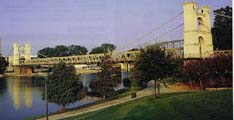
|

|
How we created McLennan Community CollegeRichard K. Moore |
|
My earliest recollection of the movement to form a community college in McLennan County goes back to the late spring of 1965 when I attended a public meeting on the subject. I was living in McGregor at the time and was director of public relations for the solid rocket division of McGregor-based Rocketdyne. Quite a few people at the meeting, which was chaired by Henry Griffin. I volunteered to help, and subsequently was appointed to the steering committee. That summer I read everything I could find on junior colleges. I visited the administrations at Temple and Hill Junior Colleges. I also went to Dallas to meet with the individuals planning a successful bond campaign for a multi-campus system. I also joined other representatives of the Waco campaign in Austin to meet with the State Education Board, which had to approve the McLennan County campaign. I also spoke to the Waco Rotary Club and McGregor Lions Club. One thing I have included in those talks was the potential economic impact of a junior college. I believe this important point is neglected today, as MCC now has over 600 employees and an annual payroll in excess of $2 million. We had conducted a survey that indicated a high level of interest among potential students for a junior college in McLennan County. A bond for $1.9 million was narrowly approved by voters in November of 1965 and I was elected to the McLennan Community College Board of Trustees. Griffin was elected chairman. I was elected vice chairman. None of us really knew what to do next, but we did have the good sense to start looking for a president. Fortunately, we soon found Dr. Wilbur Ball. I clearly recall interviewing at my office in McGregor. I didn't bother asking about his experience; I could read that in his resume. But I did probe him at some length on how he would get started with our new college., He responded with a vision and ideas. One of his great assets was that he knew where and how to find more money, available from both the state and federal governments at that time. And we all knew we needed more than $1.9 million to do anything worthwhile. The board approved Ball unanimously. |
Next we started considering locations and names. For a name I suggested something sexy like Dos Rios Community College, in recognition of our converging rivers. That was shot down pretty quickly. We settled on McLennan Community College. At the time all of our peers were called junior colleges. Ours was the first in Texas to be named a community college. Next, as chairman of the Site Selection Committee, I recommended locating on Highway 6 between Highway 84 and I-35 near Highway 6. At that time, the area was wide open and offered an opportunity to start from scratch. In the meantime, someone had found the site of the old Cameron homestead. The first time I saw it was very depressing: a run-down woodsy area, broken trees, dead bushes and a tumble-down house. Fortunately, someone else on the board had better vision or imagination. My proposal to locate MCC in the Highway 84 corridor was voted down. (I don't remember, but I probably voted for the Cameron site also.) As I recall, the Waco News Tribune didn't think much of our selection. The headline the next morning read "major blunder." Some community leaders wanted the college to be located in the then-crumbling downtown area to start the long-awaited revitalization. Although Austin and Dallas seemingly have successful in-town campuses, I believe downtown would have been a big mistake for Waco and unappealing to our potential young students; certainly we would not have experienced the growth that MCC has enjoyed. Before the campus took shape, classes were held at Texas State Technical Institute on the old Connally Air Force Base MCC ended up in its present location and I'm glad it did. I'm very proud of the small role I played in MCC's early growth and am constantly reminded by the handsome plaque that hangs on my office wall. As for me, in the late '70s things were not going well at my place of employment. We had failed to capture some badly needed government contracts and were starting to lay people off. In 1977 I was transfered to Los Angeles. However, I feel fortunate to have been able to return to Waco in retirement. |
|
Return to First Person home page |
|